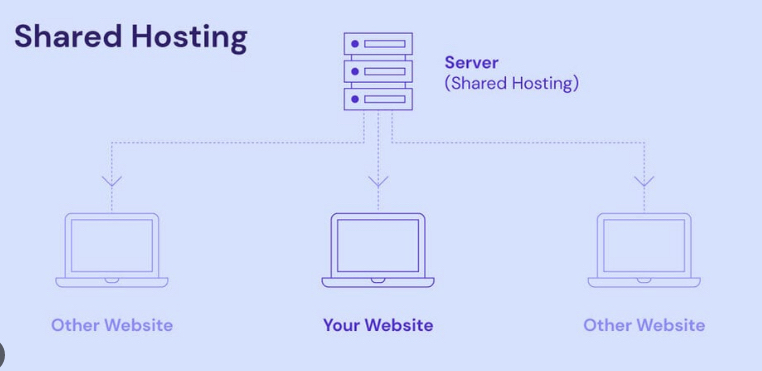
Are you struggling to find the right web hosting solution for your website? If so, you may have heard of shared hosting. It’s one of the most popular options available and can be a great fit in many cases — but is it the best choice for your business?
In this post, we’ll take an in-depth look at what is shared hosting and why or why not it might be right for you. We explore its benefits, drawbacks, suitability for different types of websites, and how to find the right provider.
We also give you some pro tips on selecting the best shared hosting provider based on various determining factors.
- Shared web hosting is where multiple websites are hosted on the same physical server, sharing resources like CPU power, memory, and disk space
- The hosting provider is responsible for the maintenance, updates, and security of the shared server
- Shared hosting is cost-effective, easy to set up and use, and requires minimal technical maintenance on the users’ side
- Shared hosting can be limiting in terms of control, customization, scalability, and security
- Shared hosting is an excellent option for small businesses, personal bloggers, non-profit organizations, e-commerce, and educational websites
- When choosing a shared hosting package, consider uptime and reliability, security features, pricing, scalability options, customer service, and reputation
Definition of Shared Hosting
Shared hosting is a type of web hosting where multiple websites are hosted on the same web server and share their resources. This means that resources like CPU power, memory, and disk space are shared among different websites.
It is a popular choice among new website owners, small businesses, and individuals, as it offers an affordable solution for hosting their sites. It is also an ideal option for those who do not require a lot of server resources or have minimal traffic.
However, since many websites share the same resources, there may be limitations on bandwidth usage and potential issues with website performance.
Despite these limitations, shared hosting remains widespread due to its affordability and ease of use.
How Does Shared Hosting Work?

In shared hosting, your hosting provider creates server space that is shared among multiple users. Each user gets an allocated disk space with a control panel where they can manage their resources.
The hosting provider also creates individual accounts for every customer and assigns them resources based on their selected hosting plan.
All the users share the same resources like CPU, RAM, and bandwidth. Every user uploads their website files on the server through the control panel or using FTP.
When someone visits your website, the server fetches your website’s files and loads them into their browser.
Since many websites are hosted on the same server and use the same resources, performance, and speed could be impacted by other websites’ resource usage.
It is the responsibility of the hosting company to ensure the server is updated, remains secure, and runs smoothly to the benefit of the users.
What Are the Advantages of Using Shared Hosting?
While every hosting type has its merits, the advantages of shared hosting make it an excellent choice for individuals and small businesses.
Cost-Effective
One of the most significant advantages of shared web hosting is that it’s cost-effective.
Since numerous websites share the same server resources, the cost of maintaining the server is spread across multiple users. This results in lower costs for each user. This is ideal for individuals and small businesses with limited web hosting budgets.
Easy to Use
Shared hosting is extremely user-friendly, making it an excellent choice for website owners with little technical expertise.
Most shared hosting plans have a user-friendly control panel that makes it easy to manage your website, install applications, set up email, and perform other common tasks. This means that you don’t need to be a tech expert to run your site effectively.
Minimal Technical Maintenance Required
Shared hosting requires minimal technical maintenance. When you sign up for a shared hosting package, your web hosting company takes care of server maintenance and security, ensuring your website is safe and running smoothly.
This means you don’t need to worry about technical issues like server updates, security patches, or backups, as your hosting provider takes care of them.
Scalability
Shared hosting plans are often scalable, meaning you can upgrade to a higher-tier plan as your website grows. This is ideal for small businesses that anticipate growth in the future. They can start with a lower-tier plan and upgrade to a higher-tier plan as their website traffic increases.
Most shared hosting providers also offer a range of hosting plans, making it easy to find what best suits your needs.
Quick and Easy Setup
Shared hosting plans are quick and easy to set up, so you can get your website up and running in no time.
Most hosting services offer one-click installation of popular applications like WordPress, Joomla, and Drupal. This allows you to set up your website without any technical knowledge.
No Server Management Required
With shared hosting, the web host handles all the server setup, maintenance, and management for you.
They take care of things like server maintenance, software updates, security, and backups. This means you don’t need to worry about technical management of your shared hosting environment and can focus on your website instead.
Customer Support
Another major advantage of shared hosting is the support you get. Most reputable web hosting companies offer customer support around the clock, so you can get help whenever needed.
They have support teams trained to handle all kinds of web hosting issues and usually respond within minutes. This can be a lifesaver if you’re not tech-savvy or encounter an urgent problem with your website.
Access to Features and Tools
Shared hosting providers offer a range of features and tools that can make your website more robust and functional.
These tools include website builders, content management systems, email hosting, and e-commerce integrations. Some web hosting companies even offer free SSL certificates and SEO tools to help you improve your website’s security and search engine visibility.
Flexibility
Finally, shared hosting offers great flexibility to users. Most shared hosting providers offer multiple options to choose from, depending on your budget and website’s requirements.
You can choose from different plans offering different storage amounts, bandwidth, and resources. This means you can start with a basic plan and upgrade as your website grows.
They also offer easy migration options if you want to move to a different hosting plan or web host.
Are There Any Limitations of Shared Hosting?
Although shared hosting offers many benefits, there are a few limitations and drawbacks that every web developer and website owner should be aware of.
These will help make the best choice between Shared Hosting vs. Cloud Hosting. Here are some of the main disadvantages of shared hosting:
Limited Resources
One of the most significant limitations of shared hosting is its limited resources.
The server’s resources, including storage space, bandwidth, and CPU usage, are shared among numerous websites hosted on the shared server. This can lead to slower website speed or temporary suspension of the website during high-traffic situations.
To avoid this, it’s crucial to choose a shared hosting provider that offers flexible resource allocation options or to upgrade to a VPS hosting (virtual private server) or dedicated server hosting when necessary.
Security Risks
Another possible drawback of shared hosting is security risks. As many websites share the same physical server, vulnerabilities in one website can potentially affect others as well.
This can expose your website to security threats like hacking, phishing, and malware attacks.
To mitigate these risks, it’s essential to select a shared hosting service that offers robust security features, such as firewalls, malware scanners, and SSL certificates. It’s also vital to keep your website software and plugins up-to-date and implement strong passwords and user authentication.
Find out more about website security components here: Security Components Explained.
Lack of Control
Shared hosting also has limitations in terms of control over the server’s configurations and settings.
Since it’s a shared server, the provider has to implement global settings and policies to ensure the security and stability of the server. This can limit your control over specific configurations, such as PHP versions and server modules.
Sometimes, this can cause compatibility issues with your website software or limit its functionalities.
Limited Customization
Along with limited control, shared hosting also offers limited customization options.
As the server’s resources are shared, the provider has to restrict the installation of custom software, scripts, or modules that can affect other websites on the server.
Therefore, you may face limitations in customizing your website’s features. For instance, you may be unable to install third-party plugins or run custom code.
To address this, it’s essential to check your hosting provider’s customization policy and choose one that allows some customization.
Limited Scalability
Finally, shared hosting may also have scalability limitations that can affect your website’s performance during high-traffic periods.
Due to shared resources, the provider may limit the number of simultaneous visitors, file requests, or database queries to maintain stability and prevent overloading. This can lead to slower website speed or temporary suspension of the website during peak hours.
To avoid this, consider upgrading to a VPS or dedicated server or choosing a shared hosting provider that offers flexible scalability options.
Who Is Shared Hosting Suitable For?

With its affordability, scalability, and essential tools, shared hosting is an excellent option for a variety of websites and businesses. It’s particularly attractive for individuals and businesses working on a limited budget.
Here are examples of businesses and websites that benefit the most from shared hosting.
Small Businesses
Shared hosting is an ideal option for small businesses that are just starting. Small businesses typically have small budgets, and shared hosting is cost-effective for businesses that need to keep an eye on their expenses.
Additionally, small businesses do not have massive traffic requirements; hence, a shared server is always sufficient.
For instance, shared hosting would be suitable if you own a retail store that requires a website with simple features like contact forms and a product catalog.
Other businesses that benefit from shared hosting include brick-and-mortar stores, freelancers, and professional service providers like lawyers or accountants.
Personal Bloggers
If you are a blogger looking for a cost-effective hosting option, shared hosting is an excellent choice. Personal bloggers usually have small traffic requirements, and shared hosting can accommodate such traffic.
Additionally, shared hosting plans come with easy-to-use website builders and pre-installed CMS like WordPress. They also offer access to site-building tools like Weebly and Wix.
These features make it easy for personal bloggers, even those without coding experience, to set up their websites.
Non-Profit Organizations
Non-profit organizations often have a limited budget and shared hosting is an excellent option as it offers affordable rates.
Shared hosting provides features that can enhance the functionality of non-profit websites, like SSL certificates for secure online donations. They also offer unlimited disk space, bandwidth, and easy-to-use tools for managing email accounts and databases.
For non-profits, they can get the support they need to manage their website without breaking the bank.
E-Commerce Websites
E-commerce websites with moderate to low traffic can thrive on shared hosting. This hosting option offers SSL certificates for secure transactions, easy-to-use shopping cart software, and easy integration with payment gateways like PayPal.
Shared hosting plans are scalable, meaning businesses can start small and upgrade as they grow. With this type of hosting, e-commerce websites can enjoy a range of features at affordable rates, making them a suitable choice for startups.
Educational Websites
Shared hosting is an excellent option for educational websites like blogs, wikis, and student portals for schools and colleges.
The hosting option comes with pre-installed CMS like Joomla and WordPress, which makes it easy to create and manage content. The pricing plans are often affordable, which makes them an attractive option for schools and universities that need to keep costs under control.
Additionally, shared hosting plans have email features, which facilitate communication between students and instructors.
Pro Tips: How to Choose the Right Shared Hosting Provider?
Choosing the right hosting provider is crucial for the success of your website. With so many options available, it can be challenging to make an informed decision.
Here are some of the most important factors to consider when choosing a hosting provider for your website.
Uptime and Reliability
The uptime guarantee and track record of reliability are very important factors to consider when choosing any web hosting service.
Uptime refers to the time when your website is up and running without any interruptions, and you want your website to have the maximum uptime possible. A reliable host should offer an uptime of at least 99.9%.
To check the uptime guarantee, look for it on the hosting provider’s website. Also, check the hosting provider’s track record of reliability by reading customer reviews and industry awards.
Support and Customer Service
Support and customer service are other important considerations when choosing a hosting service.
You might encounter technical problems with your website, and you’ll need help to solve those issues. Look for a provider that offers excellent customer support, such as 24/7 phone, live chat, email, or ticket support.
Evaluate the quality of service by checking for response time, the type of support offered, and customer feedback.
Security Features
Website security is critical, and you don’t want your website to be hacked or attacked by cybercriminals. Therefore, look for a hosting provider that offers advanced security features such as SSL certificates, firewalls, malware scanning, DDoS protection, and backups.
SSL certificates will protect your website’s data by encrypting the data. The firewall will protect your website from malicious traffic, while malware scanning will detect and prevent malware from entering your website.
Web hosts offering such features can offer peace of mind knowing that your website is safe from hackers and other security threats.
Scalability Options
Your website’s traffic might grow unexpectedly, and you’ll need to upgrade to VPS or dedicated hosting. Therefore, you need to look for a host that offers scalability options, such as the ability to upgrade your hosting plan.
You should be able to upgrade without downtime, exceeding your hosting resources, or incurring extra charges. Always check if the provider offers flexible hosting plans to accommodate your website’s traffic growth.
Price and Value
Price and value are important considerations when choosing a shared hosting plan. Evaluate the pricing structure to ensure that you get value for your money.
Check if the provider offers discounts or promotions, such as free domain registration, free backups, or a money-back guarantee. You should also compare the pricing structure of different hosting providers to help you get the best deal.
User-Friendly Control Panel
A user-friendly control panel is essential for the efficient management of your website. The control panel is the interface you’ll use to manage your website, and you want it to be user-friendly, functional, and customizable.
Therefore, you evaluate the control panel’s features, such as ease of use, functionality, and customizations.
The control panel should also offer various tools to manage your website, such as website builder, database management, email management, file management, and website statistics.
Reputation and Reviews
The hosting provider’s reputation is another important factor you should never ignore.
Before you choose a provider, be sure to check the customer feedback and online reviews. This will give you an insight into the quality of services they offer and what kind of customer experience you can expect from them.
You should also check if the provider has won any industry awards, which is a sign of excellence in the hosting industry.
Conclusion
We answered the crucial question: What is shared hosting? It’s a hosting solution where more than one website shares storage space on a single server.
Many web hosting companies offer shared hosting packages as it’s an excellent choice for anyone looking for a cost-effective and secure hosting solution.
If you want to maintain an online presence on a budget, consider getting a shared hosting plan from our list of the best shared hosting providers.
Next Steps: What Now?
- Get shared hosting for your website from the best shared hosting providers of 2023.
- If you prefer VPS hosting, get one from the best VPS hosting providers of 2023.
- You can also get dedicated hosting from the best dedicated server hosting providers.
- Learn the differences between VPS and shared hosting here: VPS vs. Shared Hosting.
- Learn the differences between shared and dedicated hosting here: Shared vs. Dedicated Server.
Further Reading – Useful Resources
- The Pros and Cons of Shared Hosting
- Shared Hosting Security: A Guide to Keeping Your Website Safe
- Shared Hosting for E-commerce Websites
- Shared Hosting with a Dedicated IP: What Is It and Why Do You Need It?
- Shared Hosting Unlimited Domains: Learn All the Advantages
- Shared Hosting Traffic Limit
- Hosting Types — The Difference between Shared, VPS and Dedicated
- What Is The Difference Between Shared Hosting and Cloud Hosting?







